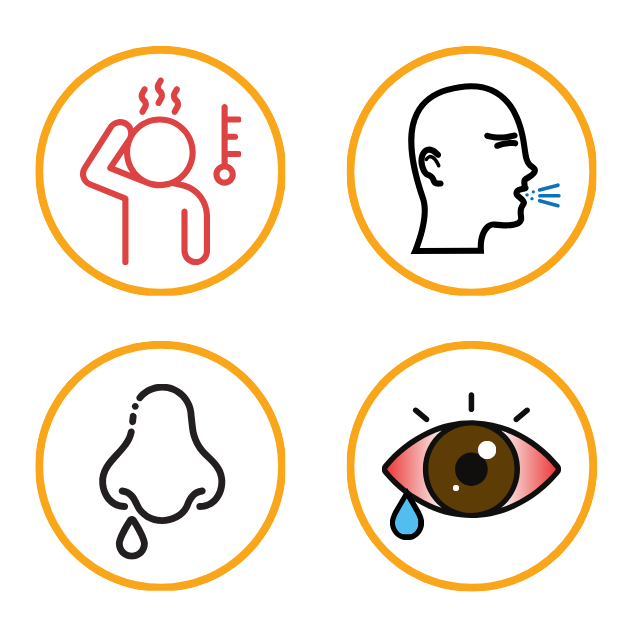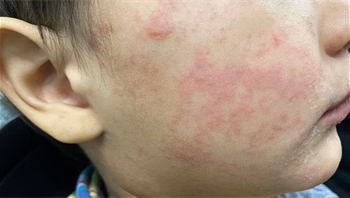Measles Information

Measles is a highly contagious, vaccine-preventable disease caused by the measles virus (rubeola virus). Measles is not just a rash - it can cause serious health complications, especially in babies and young children. The best protection against measles is vaccination.
The Wyandotte County Public Health Department offers MMR (measles, mumps, and rubella) vaccines through our Immunization clinic. We also offer testing in our Laboratory to check for immunity against measles for adults who aren't sure if they are immune.
Jump to a section:
Update as of 3/28/2025:
- There have been more than 350 cases of measles connected to a regional outbreak in Texas and New Mexico.
- There have been 23 cases of measles in southwest Kansas.
- There have been no measles cases identified in Wyandotte County.
Stay up to date on measles cases and outbreaks:
About Measles
Measles symptoms can include high fever, cough, runny nose, red/watery eyes, and a rash with flat red spots that appears a few days after your first symptoms begin.
The first symptoms of measles start between 7 and 21 days after being exposed to the measles virus (average of about 11 to 12 days).
The first symptoms of measles usually include:
- High fever (may spike to more than 104° F)
- Cough
- Runny nose (coryza)
- Red/watery eyes (conjunctivitis)

2-3 days after symptoms start: white spots in the mouth
Tiny white spots called Koplik spots could appear inside the mouth two or three days after symptoms started.

3-5 days after symptoms start: measles rash
- The rash usually starts with flat red spots on the face near the hairline, then spreads down the neck, trunk, arms, legs, and feet.
- Small, raised bumps can appear on the flat spots, and spots may become joined together.
- The person's fever may spike to more than 104° F when the rash appears.
Examples of what the measles rash can look like:


Common complications of measles:
About 1 in 5 unvaccinated people in the U.S. who get measles is hospitalized. Severe complications such as pneumonia (infection of the lungs) and encephalitis (swelling of the brain) can be fatal. If you are pregnant and have not had the MMR vaccine, measles may cause a premature birth or a low-birth-weight baby.
It is also possible to develop long-term complications years after infection.
The measles virus spreads when an infected person breathes, coughs, or sneezes. Measles can live in the air and on surfaces for 2 hours in a closed space after an infected person leaves.
A person with measles can spread it to others from 4 days before through 4 days after the measles rash appears, which means someone could spread measles before knowing they have it. According to the CDC, a person with measles could infect up to 90% of the people near them who are not immune.
Measles is a human disease (it doesn't affect animals), so measles can't spread between animals and humans.
The best protection against measles is vaccination with the MMR (measles, mumps, and rubella) vaccine. Contact your healthcare provider or local health department for vaccinations.
Children should get two doses of MMR vaccine, spaced apart:
- First dose between 12-15 months old
- Second dose between 4-6 years old
If your child is behind on immunizations, it is not too late to catch up! Talk to your doctor or local health department about getting your child caught up on vaccinations.
Adults: You likely need to get the MMR vaccine if:
- You are unsure if you ever received a measles vaccine or had measles
- You only got one dose of the MMR vaccine
- You were born between 1957 and 1967, when you may have received a dose of an earlier, less-effective measles vaccine than the current MMR vaccines
If you wish, you can get a laboratory test called a titer test to check for measles immunity. The Wyandotte County Public Health Department offers testing for a fee through our Laboratory. However, there is no harm in getting additional doses of MMR vaccine if you are immune, so you may opt to go ahead and get vaccinated without getting titer testing.
The Wyandotte County Public Health Department offers childhood immunizations through the Vaccines for Children (VFC) program for eligible kids 18 and under ($20 administration fee for each vaccination; no charge for the vaccines themselves). We also offer immunization for adults. We accept the following types of health insurance for adults: Kansas Medicaid, Aetna, Blue Cross Blue Shield, Cigna, UnitedHealthcare, and Point Comfort Underwriters.
Call (913) 573-8855 to make an appointment Monday - Thursday. We accept walk-ins on Fridays, 8:30 AM - 3:30 PM.
You can also talk to your doctor or your child's doctor or check with other local clinics about immunization services.
Before travel, get all CDC recommended vaccines, especially if you will be traveling to areas with recent outbreaks. During travel, take precautions like handwashing and masking indoors. Monitor for any illness symptoms after you return.
CDC Measles Information
Kansas Department of Health and Environment - Measles Information
Measles is a reportable disease in Kansas for healthcare providers and other mandated reporters. You must report confirmed or suspected cases of measles to public health within 4 hours.
- Report to the Kansas Department of Health and Environment: 877-427-7317
- Report to the Wyandotte County Public Health Department: (913) 573-6712
Learn more on our Disease Reporting for Providers page.
See more guidance for healthcare providers in a measles update from the Kansas Department of Health and Environment, March 3, 2025.